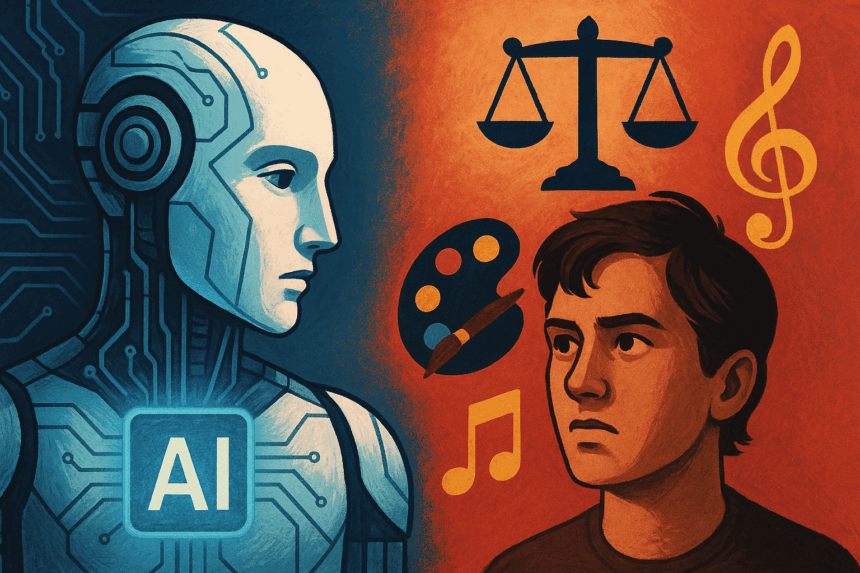The Growing Trouble with Machine ‘Creativity’
Artificial intelligence is reorienting how people work, think, and create. Yet as it spreads deeper into creative and professional spaces — from courtrooms to concert halls — questions about ethics, ownership, and accountability are getting louder.
Recent cases in law, publishing, and entertainment represent how quickly AI disrupts norms. From a lawyer citing fake cases created by ChatGPT, to actors protesting digital clones, to music companies racing to control AI audio. These controversial waves force every industry to confront the same question: when does assistive AI turn harmful?
What’s Happening & Why This Matters
A Lawyer’s Lesson: AI in the Courtroom

In the UK, a barrister (aka, a lawyer) faces disciplinary action after submitting AI-generated legal arguments. The trouble: the arguments are riddled with fake citations. The barrister allegedly relied on ChatGPT to prepare portions of a hearing submission. Later, it was discovered the cases cited never existed.
The Bar Standards Board found that the misconduct jeopardized professional integrity and the reliability of court proceedings. Legal analysts warn that even with disclaimers, using generative AI in legal filings without verification risks eroding public trust in the justice system.
One London-based ethics consultant told TechFyle:
“Law is built on precedent. AI doesn’t understand precedent; it generates probability. That’s a dangerous mismatch.”
Courts worldwide now draft clearer rules around AI use. In the United States, Federal District Courts and state bars require lawyers to verify any AI-generated citations or arguments. They incur sanctions otherwise.
Actors and Artists Draw Their Line
In the arts, Equity, the UK’s trade union for performers, threatens mass industrial action over what it calls “exploitative” AI practices. The group demands enforceable rules to prevent film and television studios from using AI to replicate actors’ likenesses or voices without consent or compensation.
The strategy follows mounting tensions across Hollywood after producers experimented with digital doubles to cut costs and streamline production. Many performers found their scanned images reused in scenes they never approved or paid for.
Equity’s general secretary, Paul W. Fleming, says the issue transcends individual contracts:
“AI shouldn’t replace performance. Consent, credit, and fair pay aren’t negotiable. We’re not fighting innovation — we’re fighting exploitation.”
The union’s position mirrors comparable standoffs in the United States under SAG-AFTRA. The union reached a temporary agreement last year. Both groups advocate for human-led artistry though studios are increasingly tempted by automation.
Spotify, AI, and the Muscial Balancing Act

The music world is taking a slightly different tact — collaboration over confrontation. Spotify recently announced partnerships with Sony Music Group, Universal Music Group, and Warner Music Group. The consoritum wants to create “responsible AI” systems that respect copyright and artist rights.
The streaming music leader favors ethical development amid lawsuits against AI companies Udio and Suno. Each is accused of training models on copyrighted material.
Spotify’s blog post states bluntly:
“Some in tech believe copyright should be abolished. We don’t. Musicians’ rights matter. Copyright is essential.”

Through this collaboration, Spotify plans to develop new tools for artists. They will generate licensed AI remixes, voice-based personalization, and interactive music experiences. This will ensure creators maintain full control.
Universal Music CEO Sir Lucian Grainge reinforced the same principle in a memo to staff:
“We’ll only license an artist’s voice or music with consent. The creative economy depends on trust.”
The company already invests in a Generative AI Research Lab, which will test new formats that prioritize transparency, fair attribution, and royalty protection.
Publishers vs. Google

While Spotify builds alliances, Italian news publishers are embracing a tougher stance. Through the Federation of Italian Newspaper Publishers (FIEG), they demand that Italy’s communications regulator Agcom investigate Google over its AI-generated summaries feature, AI Overviews.
Publishers accuse Google of being a “traffic killer.” They argue that summarizing articles so effectively causes users to stop clicking through to the original sites. FIEG argues that this practice violates the EU’s Digital Services Act, reducing media visibility and destroying ad-based revenue models that keep journalism alive.
Their statement reads:
“AI Overviews reduce discoverability, harm economic sustainability, and distort democratic debate.”
Studies by Authoritas and Pew Research Center support the concern. The studies cite traffic losses of up to 80 percent when AI summaries dominate search results.
In response, Google defends the feature as an “assistive experience,” claiming critics misunderstand its methodology. Yet the issue extends beyond one product — it is indicative of the fraught positiions between algorithmic efficiency and human creativity, a conflict defining this decade.
TF Summary: What’s Next
The intersection of AI, law, and art creates both opportunity and chaos. Lawyers, performers, and publishers share one front: demanding accountability from machines that mimic human craft.
Expect global regulations to tighten. Governments prepare new frameworks for consent, credit, and compensation. Industries once split by medium — law, media, and entertainment — now converge around the same question: Who owns creative labor in an AI world?
MY FORECAST: As the creative sector learns from early missteps, collaboration and consent will replace blind adoption. Until then, the debate over AI behaving badly grows louder — one courtroom, one film set, and one song at a time.
— Text-to-Speech (TTS) provided by gspeech


